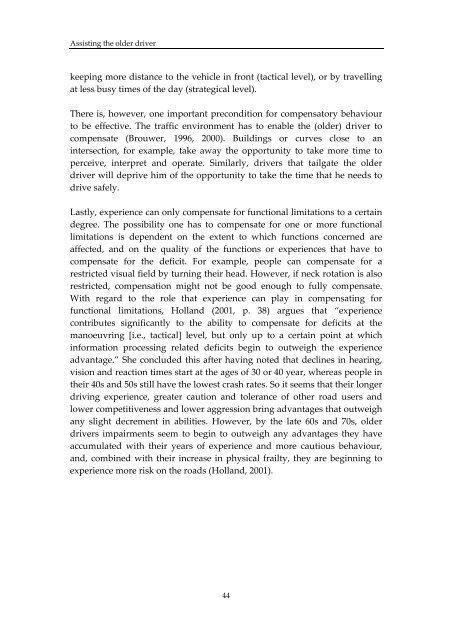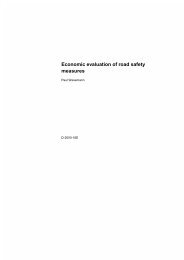Assisting the older driver - SWOV
Assisting the older driver - SWOV
Assisting the older driver - SWOV
You also want an ePaper? Increase the reach of your titles
YUMPU automatically turns print PDFs into web optimized ePapers that Google loves.
<strong>Assisting</strong> <strong>the</strong> <strong>older</strong> <strong>driver</strong><br />
keeping more distance to <strong>the</strong> vehicle in front (tactical level), or by travelling<br />
at less busy times of <strong>the</strong> day (strategical level).<br />
There is, however, one important precondition for compensatory behaviour<br />
to be effective. The traffic environment has to enable <strong>the</strong> (<strong>older</strong>) <strong>driver</strong> to<br />
compensate (Brouwer, 1996, 2000). Buildings or curves close to an<br />
intersection, for example, take away <strong>the</strong> opportunity to take more time to<br />
perceive, interpret and operate. Similarly, <strong>driver</strong>s that tailgate <strong>the</strong> <strong>older</strong><br />
<strong>driver</strong> will deprive him of <strong>the</strong> opportunity to take <strong>the</strong> time that he needs to<br />
drive safely.<br />
Lastly, experience can only compensate for functional limitations to a certain<br />
degree. The possibility one has to compensate for one or more functional<br />
limitations is dependent on <strong>the</strong> extent to which functions concerned are<br />
affected, and on <strong>the</strong> quality of <strong>the</strong> functions or experiences that have to<br />
compensate for <strong>the</strong> deficit. For example, people can compensate for a<br />
restricted visual field by turning <strong>the</strong>ir head. However, if neck rotation is also<br />
restricted, compensation might not be good enough to fully compensate.<br />
With regard to <strong>the</strong> role that experience can play in compensating for<br />
functional limitations, Holland (2001, p. 38) argues that “experience<br />
contributes significantly to <strong>the</strong> ability to compensate for deficits at <strong>the</strong><br />
manoeuvring [i.e., tactical] level, but only up to a certain point at which<br />
information processing related deficits begin to outweigh <strong>the</strong> experience<br />
advantage.” She concluded this after having noted that declines in hearing,<br />
vision and reaction times start at <strong>the</strong> ages of 30 or 40 year, whereas people in<br />
<strong>the</strong>ir 40s and 50s still have <strong>the</strong> lowest crash rates. So it seems that <strong>the</strong>ir longer<br />
driving experience, greater caution and tolerance of o<strong>the</strong>r road users and<br />
lower competitiveness and lower aggression bring advantages that outweigh<br />
any slight decrement in abilities. However, by <strong>the</strong> late 60s and 70s, <strong>older</strong><br />
<strong>driver</strong>s impairments seem to begin to outweigh any advantages <strong>the</strong>y have<br />
accumulated with <strong>the</strong>ir years of experience and more cautious behaviour,<br />
and, combined with <strong>the</strong>ir increase in physical frailty, <strong>the</strong>y are beginning to<br />
experience more risk on <strong>the</strong> roads (Holland, 2001).<br />
44
















